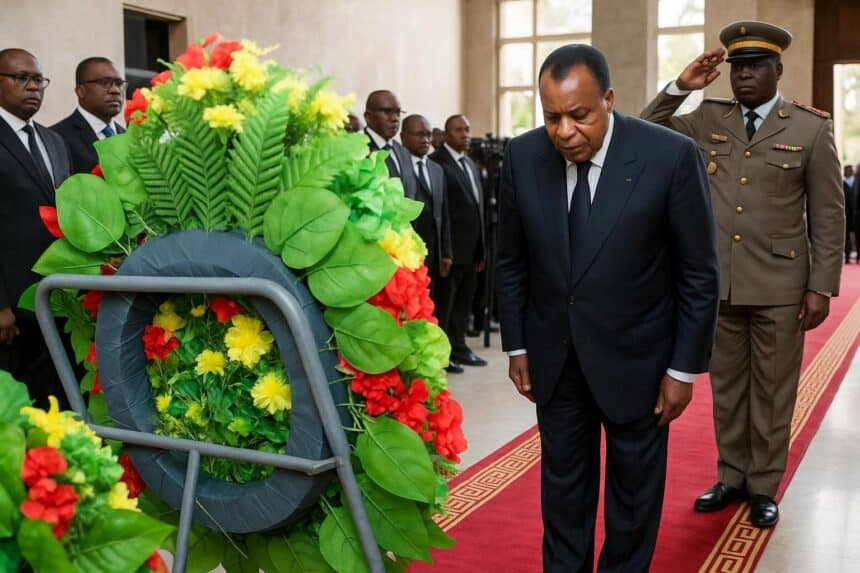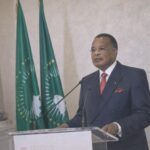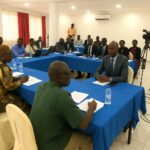State Salute In Brazzaville
A warm September sun bathed the esplanade of the Palais du Peuple as President Denis Sassou Nguesso bowed before the flag-draped coffin of Zacharie Kimpouni. Military honors, prayers and a moment of silence sealed a national farewell broadcast live by Télé Congo and Radio Congo (Radio Congo, 18 September).
The ceremony echoed earlier tributes from the National Assembly and the Ministry of Youth, which praised the deceased as “a guardian of republican values.” After the protocol, the cortege left for Madingou in Bouenza, where the former minister’s family plot awaited him (Les Dépêches de Brazzaville, 19 September).
Teacher First, Always
Born in 1950, Kimpouni developed a passion for pedagogy at the École Normale Supérieure before joining Marien-Ngouabi University as a lecturer in civic education. Even in cabinet, he insisted on keeping one weekly seminar, joking that “a blackboard keeps one humble,” recalled colleague Prof. Thérèse Mabika.
Retired since 2017, he continued mentoring debate clubs and writing columns on citizenship for the daily La Semaine Africaine. “He never lost the professor’s habit of asking the hardest question,” said former student Miguel Mboukou, now a civil-society advocate.
His academic research underpinned the first National Civic Education Plan, adopted in 2008. The text, still referenced by today’s teachers, integrates local proverbs into modern curricula, making lessons resonate across villages and city classrooms alike.
A Quiet Yet Influential Political Path
Kimpouni’s political journey began inside the Union Panafricaine pour la Démocratie Sociale, where he drafted policy papers on youth engagement. He later joined the Parti Congolais du Travail, aligning his civic ideals with the government’s social vision (Archives nationales).
President Sassou Nguesso appointed him Minister of Civic Education and Youth in September 2009, a portfolio he held for nearly two years. Current Prime Minister Anatole Collinet Makosso, who succeeded him in 2011, described Kimpouni as “the architect behind today’s participative youth forums.”
Though never the loudest voice in cabinet, friends recall his talent for forging consensus. “He negotiated between ministries like a patient tutor, highlighting common ground instead of differences,” said former director of cabinet Franck Ndinga during the Brazzaville vigil.
Blueprint For Youth Empowerment
During his mandate, Kimpouni oversaw the drafting of the National Youth Policy, prioritising vocational training, digital literacy and community service. The program later helped thousands secure micro-grants for start-ups, according to the Ministry of Small Businesses (ministerial report, 2022).
He championed Congo’s ratification of the African Youth Charter in 2009, an act that opened additional African Union funding for local youth projects. Regional observers note that Bouenza now hosts three charter-aligned resource centres, offering free legal and career advice.
Crucially, he facilitated the launch of the National Youth Council, providing an institutional voice for under-35 citizens. “Without his push, we would still be an informal WhatsApp group,” smiled council president Christelle Kodia, laying a wreath in Madingou.
Voices From Madingou And Beyond
Hundreds lined the road into Madingou, holding portraits of the late minister as the hearse crawled past. In the main square, a choir sang traditional Beembe laments, merging ancestral rhythm with civic lyrics he once penned for school choirs.
At the graveside, eldest son Aristide thanked the Head of State for granting national honors, telling mourners, “My father loved this land so fiercely he wrote it into every lesson.” Local farmer Célestin Ngolo added, “He taught us that planting cassava is also planting peace.”
Messages of sympathy poured in from the African Union’s youth division, UNESCO’s regional office and former students now spread across Central Africa. Social media feeds filled with photos of the professor’s signature chalk-smudged suit, hashtagged #MindeleYaPatriote, Lingala for “The Patriot’s Teacher.”
Sustaining The Civic Flame
The Ministry of Civic Education announced a forthcoming annual essay prize in his name, encouraging pupils to explore citizenship themes through local languages. Details are expected before the new academic year, with winning texts set to appear in the national press.
Meanwhile, university colleagues propose digitising Kimpouni’s lecture notes, transforming decades of handwritten reflections into open-access material for teachers nationwide. The project, if funded, could modernise civic instruction and keep his voice present in classrooms long after the funeral drums fade.






















